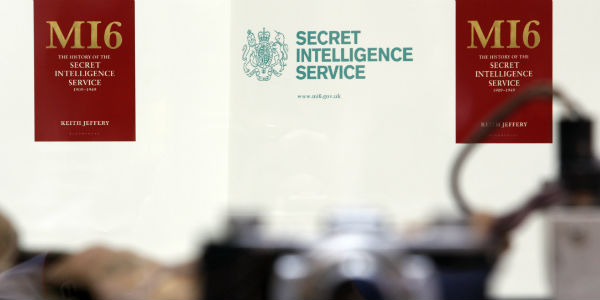The government’s handling of the Intelligence and Security Committee’s detainee reports reveals worrying tensions between them
The Parliamentary Intelligence and Security Committee (ISC) is due to publish two reports on the UK’s treatment of detainees. Andrew Defty explains how leaks ahead of their publication are part of a concerning breakdown in the relationship between government and the committee, which has implications for the proper democratic oversight of the UK’s intelligence agencies.
 Items from the Secret Intelligence Service archive on display. Picture: Foreign and Commonwealth Office, via a (CC BY 2.0) licence
Items from the Secret Intelligence Service archive on display. Picture: Foreign and Commonwealth Office, via a (CC BY 2.0) licence
An article in Tuesday’s edition of The Times reported that the publication of the Intelligence and Security Committee’s latest reports, which are due to be released today (30 June), has been complicated by last-minute changes demanded by the US government. The ISC has produced two reports on the treatment of detainees and the involvement of UK agencies in the practice of rendition. The reports are the product of an extensive inquiry, which the committee inherited when the judge-led detainee inquiry was wound up in 2013. The first will cover the period from 2001 to 2010, while the second is likely to include new material uncovered by the committee since it began work on this issue in 2014. The Times article, which quotes ‘a senior Whitehall figure’, claims that the ISC will call for ‘sweeping changes’ to the guidance provided to British intelligence officers in the field. However, it also suggests that US government requests for redactions to the historical report might serve to undermine the credibility of the inquiry.
At around midday on Tuesday, the Chair of the Intelligence and Security Committee, Dominic Grieve, issued an extraordinary statement in response to The Times article. Grieve made two points. The first was that the committee had agreed to redact ‘just one word in over 300 pages to meet a US security concern.’ He would, he added, be happy to point out the relevant section to journalists when the reports are published.
Grieve’s second point revealed his barely concealed anger that details of the reports should appear in the media before they are published and laid before Parliament. In an extraordinarily strong statement he said:
I find it unacceptable that the Government has briefed the media on our reports before they are published. These are not the Government’s reports to trail or leak as they wish. The Government is, exceptionally, given sight of the reports ahead of publication so that they can check there is nothing in them which would harm UK national security. The draft reports should have been kept on an exceptionally tight distribution within Government. It appears that that procedure has been abused in order to leak details of the reports, so as to draw the sting on Thursday.
The background to this episode is a growing tardiness on the part of the government in its dealings with the ISC, which is apparently beginning to irritate the committee’s Chair. Although the ISC is a parliamentary committee, as Grieve pointed out in his statement, because of the nature of its work, the ISC’s reports are first shared with the government so that potentially sensitive material can be removed. This is reportedly a process of negotiation between the ISC and the government which can cause tension but generally takes little more than a month. However, this has not always been the case and a number of recent reports have been held up by the government. Prior to the 2010 general election, the ISC completed a report on the draft guidance given to intelligence officers involved in the interrogation of detainees. Although the committee clearly expected the report to be published at that time, the government’s review was held up by the election and the report was never published. Similarly, the ISC’s report on the UK’s involvement in lethal drone strikes was sent to the government in December 2016. It was sent back to the committee with suggested redactions four months later, only days before the Prime Minister announced the general election. In order to facilitate publication prior to the election, the committee made the exceptional decision to accept all of the government’s proposed redactions. The committee’s annual report for 2016–17 which was also completed before the general election was not published until November 2017. Perhaps in response to recent delays, when the ISC sent its detainee reports to the government last month, it pointedly remarked that ‘the Committee expects to be in a position to publish the reports next month.’ It has made a similar statement in relation to its report on diversity in the intelligence community which was passed to the government in mid-June.
A second, perhaps more important, point about The Times article is that it undermines the secrecy within which the ISC operates, and which the committee is at pains to protect. Although it is a parliamentary committee, the ISC operates ‘within the ring of secrecy’ and has extensive access to UK intelligence agencies, personnel and documents. ISC members are all notified under the Official Secrets Act. However, at the point at which its reports are handed over to the government, the ISC loses control over them. In the process of determining what material is suitable for publication, ISC reports may be circulated widely across a range of agencies and government departments. However carefully the ISC has sought to protect the confidentiality of its work, it is at this point that leaks can and do occur.
Moreover, this is not the first time that this has happened. In 2014, ISC members were angered when details of the committee’s report into the murder of Fusilier Lee Rigby were leaked to The Sunday Times shortly before publication. The Lee Rigby report had been widely circulated within Whitehall and beyond, including to the Metropolitan Police. On that occasion, in private conversations, ISC members made it clear to me that although the report had certainly been leaked, they were confident that the leak had not come from within the ISC. There was also some surprise at the wide distribution which the report had received. This week’s leak has followed a similar pattern and Grieve’s statement clearly reflects the anger which ISC members feel when the secrecy of the committee is undermined in this way.
The seriousness of these leaks should not be underestimated. Leaks that take place during the process at which redactions are being negotiated, may represent the leak of an unredacted ISC report. If a member of the ISC had done this they would find themselves in breach of the Official Secrets Act. This may also be the case for whichever minister or official spoke to The Times this week about the ISC’s impending reports. Governments and citizens need to be able to trust the intelligence and security agencies and intelligence agencies need to be able to trust the government. Parliamentary intelligence oversight bodies act as the buckle in this relationship binding them together and ensuring that secrecy, propriety and the law are respected by all parties. Whatever the content of the ISC’s reports this week, tensions over the time taken to publish ISC reports coupled with an apparent breach in the security of the committee’s work represent worrying challenges to the democratic oversight of the UK intelligence agencies.
This post represents the views of the author and not those of Democratic Audit.
About the author
 Andrew Defty is a Reader in Politics in the School of Social and Political Sciences at the University of Lincoln. He runs the Watching the Watchers blog at Lincoln University and is co-author, with Hugh Bochel and Jane Kirkpatrick, of Watching the Watchers: Parliament and the Intelligence Services, published by Palgrave.
Andrew Defty is a Reader in Politics in the School of Social and Political Sciences at the University of Lincoln. He runs the Watching the Watchers blog at Lincoln University and is co-author, with Hugh Bochel and Jane Kirkpatrick, of Watching the Watchers: Parliament and the Intelligence Services, published by Palgrave.





 Democratic Audit's core funding is provided by the Joseph Rowntree Charitable Trust. Additional funding is provided by the London School of Economics.
Democratic Audit's core funding is provided by the Joseph Rowntree Charitable Trust. Additional funding is provided by the London School of Economics.